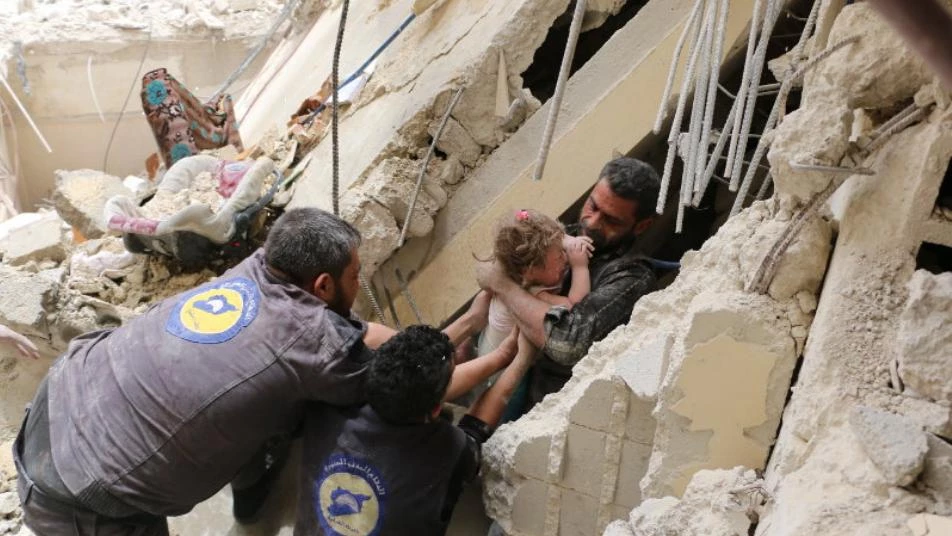Over the weekend, rights groups said that at least 22 people were killed in Russian and regime air raids. As with earlier sieges of other rebel bastions in Syria, the opposition alleged that the Assad regime militias targeted myriad hospitals and civilian homes. The sustained violence renewed fears of another catastrophic refugee exodus, with the province’s more than 3 million people desperately fleeing to Turkey or elsewhere in war-ravaged Syria.
“Too many have died already” and “even wars have laws,” declared a UN-endorsed statement from the heads of leading humanitarian organizations at the end of last month. “Idlib is on the brink of a humanitarian nightmare unlike anything we have seen this century,” it warned, using the social media hashtag #TheWorldIsWatching.
But if the world is watching, it’s not doing all that much. A long-running diplomatic process initiated by the United Nations in Geneva and backed by Washington to find a political solution to the Syrian conflict now appears moribund. A separate set of talks involving Russia, Turkey and Iranian regime will resume in early August, but these, too, seem to underscore the geopolitical complexity that hamstrings Syria’s prospects for peace.
Turkey backs a number of the rebel factions that Russia wants to dislodge in Idlib. The two countries attempted to broker an uneasy truce over the province last year, but a cease-fire collapsed in April. Neither side wants to see an all-out escalation, nor are they satisfied with preserving the status quo. Though at odds over Syria and the possible future of Assad’s rule, Turkey and Russia have been drawing closer on other fronts. Last week, Turkey received a delivery of components for the Russian S-400 antiaircraft missile system, an acquisition that infuriated its NATO allies, especially the United States.
There’s speculation that Turkey may also be poised to launch a new offensive into northeastern Syria, striking at the US-backed Syrian Kurdish militias that led the fight against ISIS. That’s a scenario that Russia may welcome, as it will possibly drive Syrian Kurds closer to the regime in Damascus, while simultaneously undermining American interests. For Ankara, such action carries huge risks, including further damaging its already tattered relationship with Washington and inflaming public opinion at home.
“Although the militaries of the two countries are currently working on the Idlib issue and discuss Turkish military operation That last question can only be met with a shrug. Content with the supposed defeat of ISIS, President Trump has repeatedly signaled his lack of interest in the Syrian endgame and, instead, opened a potentially destructive and destabilizing new front of confrontation with Iran. The White House has insisted that Iran withdraw its militant proxies from Syria as a precondition to potential talks, a demand that some analysts believe is too maximalist to be taken seriously. Charles Lister, a senior fellow at the Middle East Institute, noted that Iran specifically did not commit its proxies to the battle in Idlib, a decision that helped illustrate Assad’s relative weakness without his allies. “There is no better evidence that Assad regime lacks the manpower to regain control and hold the rest of country than recent events in Idlib,” wrote Lister, arguing that declarations of Assad’s ultimate victory are premature. "The Assad military’s inability so far to make more headway in Idlib does not mean it cannot ultimately achieve victory nationwide,” Sam Heller of the International Crisis Group told the Associated Press. “It does show, however, that its military victory is contingent on politics that are bigger than just Syria.” “The Assad regime has not ‘won’ anything,” added Lister. “It has merely survived at the cost of Syrians’ blood and fear; stability remains far out of reach.” Yet Assad and his Russian allies are acting as if that stability has already come. The regime has urged Syrian refugees in neighboring Turkey, Jordan and Lebanon — collectively home to a vast population of more than 5 million displaced Syrians — to come home. But the number of returnees so far is small. Many are afraid of being swept into the regime’s notorious prisons or extorted by pro-regime militias. Their plight is made all the more dire by the growing impatience of the three host countries, where government and society seem to be buckling under the pressure of accommodating the refugees for close to a decade. “Donor countries “We don’t know what to do, really,” a carpenter from Aleppo province now living as a refugee in Beirut told my colleagues last month. “While I’m here, all my son sees is a father who can’t provide for him, and I’m risking deportation to even go to work. But going home Edited according to Orient Net Link to the original source of the Washington Post



التعليقات (0)